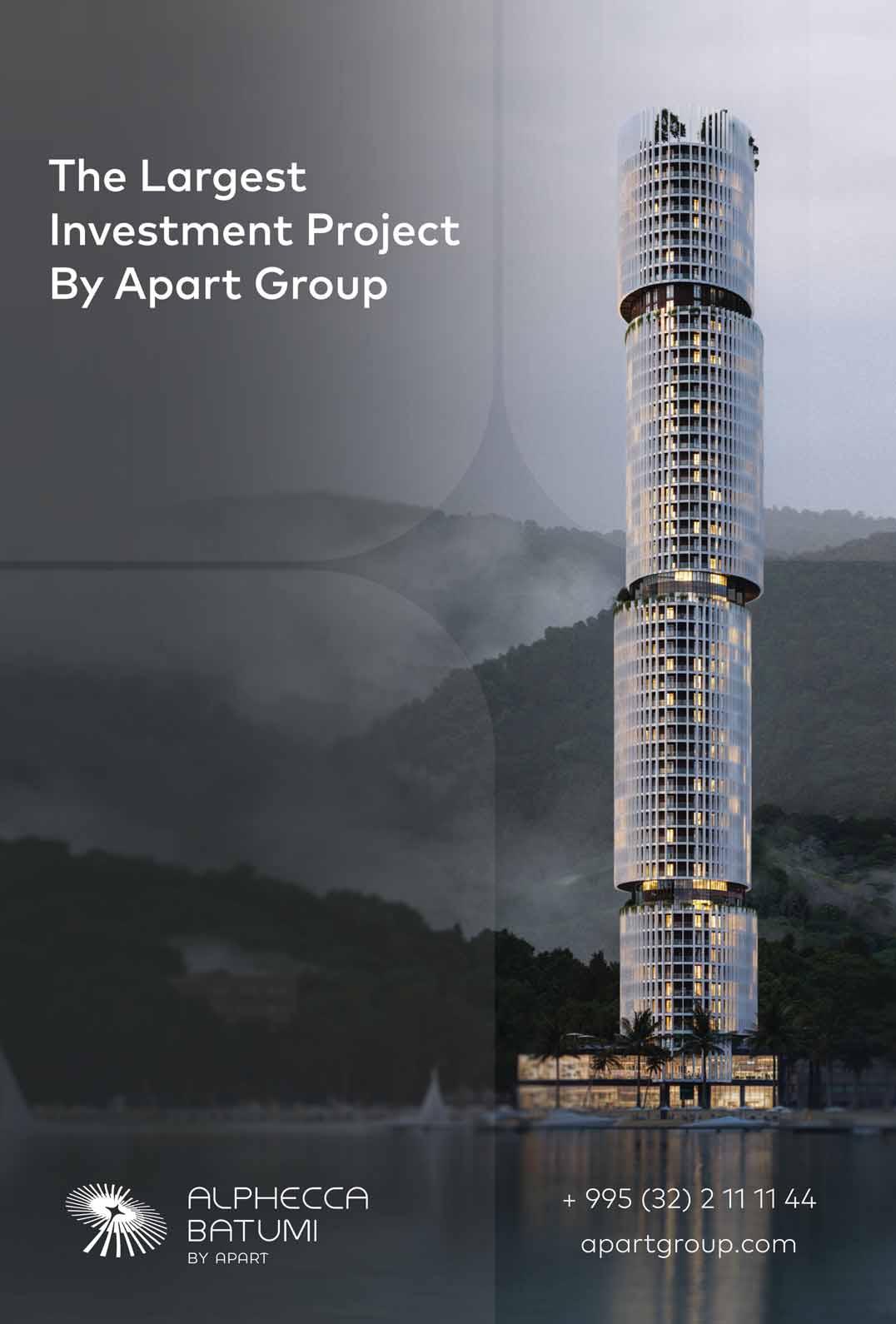




BY NIKOLOZ KHATIASHVILI – SENIOR RESEARCH FELLOW, GEOCASE
After the inauguration of the US president, the international system experienced a signi
shock. Trump’s unexpected decisions set the stage for a broader reassessment of global relations. Historically, US presidents tend to make bolder and more pragmatic decisions in their second terms. However, actions such as the suspension of USAID, tensions with Canada and Mexico over the trade issues, the weakening of support for Ukraine, and overtures toward Russia raise serious questions about the consistency and strategic direction of Trump’s foreign policy. While China and Iran remain key foreign
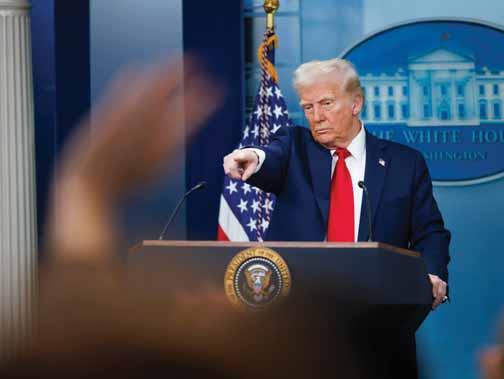
this week’s
Ukraine Latest: Two Killed in Biggest Ever Ukrainian Drone Attack on Moscow, Ukrainian Ceasefire on the Table
SJC: Amendments to the Law on Broadcasting Undermine Media Freedom of Expression
POLITICS PAGE 3
EFES Georgia Named Winner at the 'Corporate Sustainability AwardBusiness for SDGs' Contest in 2 Categories!
BUSINESS PAGE 6
EU, Sweden and FAO Celebrate International Women’s Day with Dairy Women Farmers in Tsalka
SOCIETY PAGE 9 SOCIETY PAGE 8
Academician Innes Merabishvili Turns 75
Silent Echoes: How Contemporary Art Confronts a Nation’s Fractured Identity NEWS PAGE 2
CULTURE PAGE 11


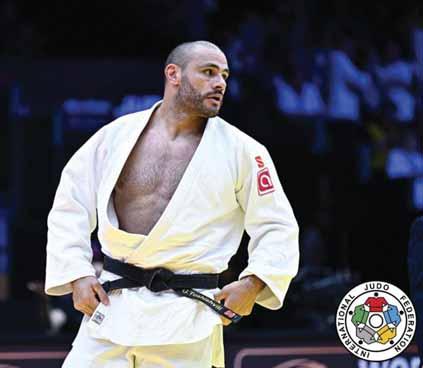
BY MARIAM RAZMADZE
After two competitive days, the Georgian judo team ended the Linz Grand Prix in Austria with new milestones, securing three medals on the final day, March 9: two golds and one silver. The -90kg category saw an all-Georgian
final, but Tato Grigalashvili did not compete against Giorgi Jabniashvili, making the latter the champion by default. Guram Tushishvili secured the second gold medal in the +100kg category. Meanwhile, Shalva Gureshidze had a chance for bronze in the same weight category but finished fifth after losing the final.
Overall, the Georgian team ranked second, only behind Japan. Both countries won two gold medals, but Japan secured more in silver.
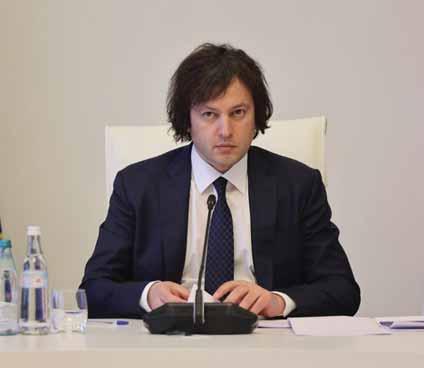
Irakli Kobakhidze. Source: gov.ge
BY MARIAM RAZMADZE
Under the leadership of Irakli Kobakhidze, the Government Commission on Higher Education Reform held a convention addressing challenges in the sector. As the Government Administration stated, discussions touched on issues concerning both infrastructure and the quality
of education in Georgian universities. Kobakhidze emphasized the need for fundamental transformation of the higher education system, saying that the commission will develop an all-encompassing concept for reform strategies soon.
He also said that the issues discussed would be addressed by 2028.
“The goal is to ensure that Georgian students have access to higher education that meets European standards without leaving the country,” the Government Administration reported.
COMPILED BY ANA DUMBADZE
UkraineonTuesdaylaunched its biggest ever drone attack on Moscow, killing at least two workers at a meat warehouse, injuring 18 others, and causing a short shutdown at the Russian capital’s four airports, Russian officials said.
A total of 337 drones were downed over Russia, including 91 over the Moscow region and 126 over the Kursk region, where Ukrainian forces have been pulling back, the Russian defense ministry said.
They went on to claim that their air defense systems intercepted most of the drones, but debris from downed UAVs caused fatalities and destruction in multiple districts. Residential areas and industrial sites reportedly sustained damage, with emergency services battling fires in several locations.
The attack led to temporary closures of Moscow’s main airports, including Vnukovo, Domodedovo, and Sheremetyevo, severely impacting air traffic. Authorities have yet to provide a full assessment of the material damage.
Kyiv has not officially commented on the attack, but Ukrainian forces have escalated drone strikes deep into Russian territory in recent months. Military analysts suggest these operations are part of Ukraine’s long-range strategy to disrupt Russian infrastructure and morale.
Despite diplomatic efforts, hostilities continue on multiple fronts. Ukrainian cities, including Sumy, Dnipropetrovsk, Kharkiv, and Kyiv, suffered overnight Russian attacks this week. The situation remains fluid, with both sides experiencing gains and losses. Important battlefield updates include:
RUSSIAN ADVANCES IN THE KURSK REGION
Russian forces have made significant progress in the Kursk region, with reports indicating that the operation is in its final stages. Russian troops have entered Sudzha, Ukraine's last significant position in the area, threatening Ukrainian supply lines. Ukrainian officials, including Chief Commander Oleksandr Syrskyi, have hinted at a partial withdrawal to preserve troops' lives. Russian President Vladimir Putin recently visited Kursk, expressing confidence in the complete liberation of the region.
ONGOING BATTLE FOR TORETSK
The battle for Toretsk continues, with
Russian forces having captured large parts of the city and surrounding settlements, including Shumy, Zalizne, Pivdenne, Druzhba, Pivnichne, and Niu-York. As of January 29, geolocated footage confirmed Russian control over 88% of the city, yet the Institute for the Study of War now suggests that Russian forces may struggle to make substantial gains due to a lack of committed forces and the wide area of responsibility.
On 9 March, it was announced that Russian forces in Toretsk were struggling to hold their crumbling defenses, with Ukrainian troops launching a decisive push into the town’s southern microdistrict. What followed was a swift and brutal assault as elite Ukrainian units overran exhausted Russian fighters, reclaiming key ground in the battle for control.
The goal of the Ukrainian forces is to completely retake control of the city and liberate it after their previous counterattacks proved successful. The Russian forces in the town have exhausted themselves from almost a year of constant and costly urban combat, exposing weak points for the Ukrainians to exploit.
THE VELYKA NOVOSILKA OFFENSIVE
Russian forces have continued their offensive in the Velyka Novosilka area, capturing several settlements, including Vuhledar, Zolota Nyva, Rivnopil, Rozdolne, Novyi Komar, Novodarivka, Blahodatne, Makarivka, and Storozheve. These advances have brought Russian troops to the outskirts of Velyka Novosilka, threatening to encircle Ukrainian forces in the area. The Institute for the Study of War reports that Russian forces have made significant progress, but Ukrainian troops continue to mount a defense.
DIPLOMACY: EUROPEAN DEFENSE MINISTERS DISCUSS UKRAINE SECURITY GUARANTEES
Defense ministers from Germany, France, Italy, Poland, and the United Kingdom met in Paris to discuss ongoing support for Ukraine.
French Defense Minister Sébastien Lecornu emphasized the importance of strengthening Ukraine’s military, stating, “There is growing consensus that Ukraine’s first and foremost security guarantee is its army.”
He also mentioned that approximately 15 countries have expressed interest in keeping this initiative, including proposed security frameworks to facilitate a ceasefire in Ukraine.
UK Defense Secretary John Healey announced that European allies will fur-
ther strengthen their efforts to form a ‘coalition of willing partners,’ ensuring Ukraine’s security in the event of a ceasefire.
The French National Assembly this week adopted a resolution supporting Ukraine. Supporters of the resolution urge the European Union and NATO to continue and expand military, political, and economic support for Ukraine.
“The National Assembly condemns Russia’s interference in democratic processes within the European Union and its neighborhood, particularly in the elections in Moldova, Georgia, and Romania,” their statement read.
RUSSIA RESPONDS
Russian Foreign Ministry spokeswoman Maria Zakharova said Thursday that Russia would view the deployment of any foreign troops in Ukraine or the construction of foreign military bases there as unacceptable. Such activity would mean the direct involvement of foreign countries in a conflict with Russia, Zakharova said, adding that Russia would take what she called appropriate measures if any country attempted to deploy its troops.
Following diplomatic talks with the US in Saudi Arabia, Ukraine proposed a 30-day ceasefire with Russia, while Washington agreed to resume intelligence sharing and military aid for Kyiv. US President Donald Trump said on Wednesday that the ball is now in Putin’s court, as US special envoy Steve Witkoff headed to Russia to discuss the ceasefire proposal. Despite this diplomatic maneuver, battlefield advances have likely left Russian President Vladimir Putin feeling little pressure to halt the fighting.
Russia has presented the United States with a list of demands aimed at ending its war in Ukraine and resetting relations with Washington, two sources familiar with the matter told Reuters on Thursday. The specific contents of Moscow's demands remain unclear, as does whether Russia is open to peace talks with Kyiv before these terms are accepted. Over the past three weeks, Russian and American officials have engaged in both inperson and virtual discussions regarding the terms, the sources said.
US President Donald Trump has warned Russian President Vladimir Putin that "devastating" sanctions would be imposed if Moscow rejects a ceasefire agreement in the Ukraine conflict.
MEP Tikhanovskaya Warns Europe: “The Empire Has an Insatiable Appetite”
BY TEAM GT
Belarusian opposition leader Svetlana Tikhanovskaya delivered a powerful speech at the European Parliament plenary session, warning that the struggle for sovereignty in Belarus, Ukraine, and neighboring countries is far from over.
“I would like to thank each of you [MEPs] for standing by not only Belarus and Ukraine, but also Georgia, Moldova and Armenia, Belarusian opposition leader Svetlana Tikhanovskaya said at the plenary session.
“I always say that unconventional times require unconventional solutions. Last year, we took such a step together. We signed a memorandum of cooperation between the democratic forces of Belarus and the European Parliament, and this was a clear message to my people, Belarus is Europe.
“From your own history, you know the true value of solidarity when your homeland is occupied. I would like to thank each of you for standing by not only
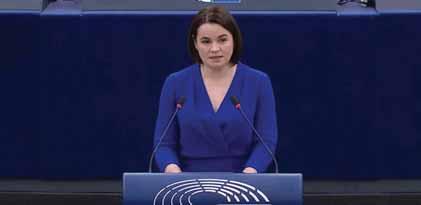
Belarus and Ukraine, but also Georgia, Moldova and Armenia.
“We all stand in a zone of uncertainty, asking ourselves who will stand with us for our freedom. Will our countries ever be safe and free if we remain in the shadow of a giant, a power that does not respect us, does not recognize our sovereignty, and denies us our place as the free nations of Europe? Should we sacrifice ourselves, offer everything to the giant in the hope that this will stop him, that he will get what he wants and not move forward?
But we know history: Empire has an insatiable appetite,” she said.
Her remarks, delivered in Strasbourg, resonated beyond Belarus, as she highlighted the struggles of Ukraine, Georgia, Moldova, and Armenia, thanking MEPs for their continued support. She also warned against appeasement, reminding lawmakers that “an empire’s appetite is never satisfied”—a clear reference to Russia’s aggressive policies in the region. As tensions persist in Eastern Europe, Tikhanovskaya’s speech served as a call to action, urging European leaders to remain steadfast in their commitment to democracy and freedom in the face of ongoing threats.
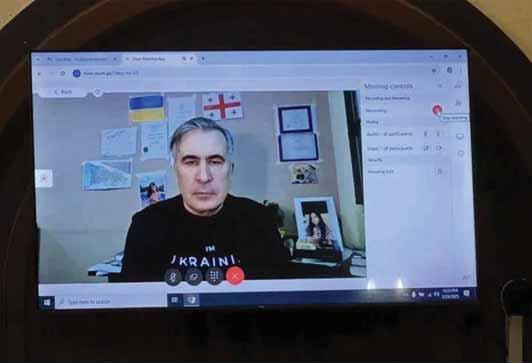
BY TEAM GT
AGeorgian court has sentenced former President Mikheil Saakashvili to nine years in prison after finding him guilty of embezzling state budget funds.
Alongside him, Teimuraz Janashia, the former head of Georgia’s Special State Protection Service, has been ordered to pay a 300,000 GEL fine.
The charges against Saakashvili stem from allegations that during his presidency, he misused public funds for personal luxury expenses. Prosecutors argued that millions of GEL were spent on
lavish accommodations, expensive travel, and other personal indulgences under the guise of official state expenditures.
The court’s ruling marks a significant development in Georgia’s political and legal landscape, as Saakashvili remains a controversial figure. His supporters claim that the charges are politically motivated, while government officials argue that the verdict upholds justice and accountability.
Saakashvili, who has previously denounced the trial as politically charged, is already serving time for other convictions. His legal team has vowed to appeal the latest verdict, calling it an attempt to silence the opposition. Meanwhile, Janashia’s legal representatives have yet to announce whether they will contest the fine imposed on him.
BY TEAM GT
The Center for Social Justice calls the three draft laws proposed by the Georgian Dream government to amend the Georgian Law on Broadcasting alarming and states that they essentially contradict fundamental rights enshrined in international human rights law and the Constitution of Georgia.
SJC says the proposed changes to the Law on Broadcasting impose stricter regulations on media outlets, increasing state oversight and potentially leading to censorship. Critics argue that these amendments would limit editorial independence, giving authorities greater control.
“This amendment introduces new regulations on broadcasting standards, including accuracy of facts, impartiality, privacy protection, and coverage of emergency situations. Previously, these matters were regulated through media self-regulation, but under the new law, the National Communications Commission will oversee compliance and impose sanctions for violations. Non-governmental organizations believe that this change could become a mechanism for restricting media freedom and punishing critical media outlets.”
“The bill bans all forms of foreign funding for broadcasters, except for commercial advertisements and product placements. Foreign entities are defined as foreign governments, non-Georgian legal entities, and individuals. This restriction threatens the financial sustainability of independent media and could potentially weaken outlets critical of the government.”

“This amendment concerns gender equality standards in broadcasting and significantly weakens their enforcement mechanisms. Specifically, the bill reduces obligations that previously required broadcasters to produce gender-sensitive content, increase the representation of women and vulnerable groups in the media, and ensure mechanisms for protection against discrimination,” the organization stated.
The proposed changes have drawn criticism from human rights organizations, opposition parties, and international watchdogs, who fear the amendments will further erode democratic institutions in the country.
The Georgian government defends the reforms, arguing that they aim to increase transparency and accountability in the media sector. However, the SJC and other civil society organizations insist that the amendments create a hostile environment for independent journalism and violate Georgia’s international commitments to press freedom and democratic governance.
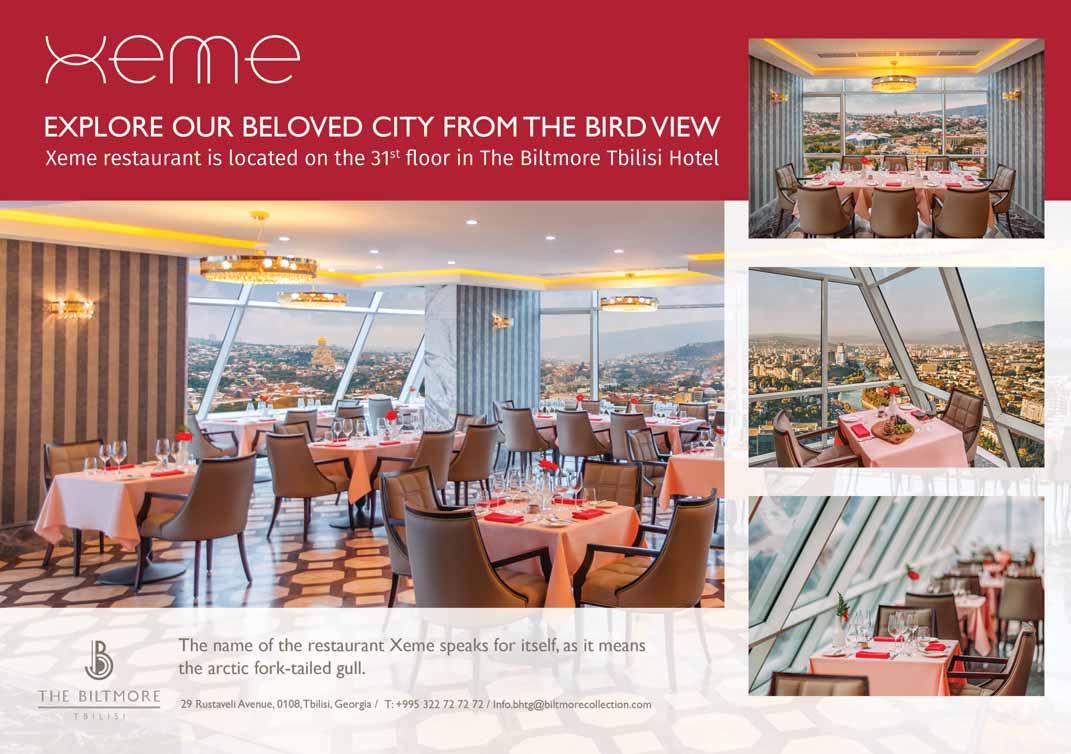
INTERVIEW BY VAZHA TAVBERIDZE
Europe must stand up, and for that, we need to break free from the nationalist tunnel vision that’s paralyzed us for decades, says Reinier van Lanschot, Dutch MEP from the Volt party. In his interview with RFE/RL’s Georgian Service, van Lanschot discusses his party's ambitious nine-point plan for transforming Europe — from creating a European army and stripping Hungary of its veto rights, to promoting Estonian PM Kaja Kallas as a pan-European foreign minister. He also talks about Georgia, which he recently visited as a member of the European Parliament fact-finding mission, and warns that the Georgian Dream government’s shift toward a "Russian-style autocracy" is accelerating faster than anyone expected.
STRIPPING HUNGARY OF VETO RIGHTS, CREATING A COMMON EUROPEAN ARMY, “PROMOTING” KAJA KALLAS TO EU-WIDE MINISTER OF FOREIGN AFFAIRS – YOUR NINE-POINT PLAN IS CERTAINLY “A BOLD, ACTIONABLE PLAN,” BUT HOW ACTIONABLE IS IT? AND BY WHOM?
If the EU wants to, it's actionable. It depends on the will of the member countries’ governments. Right now, Europe is on its knees. If they want Europe to stand up, the plan points at the necessary steps to make. For Europe to stand up, we need our heads of state to get out of the nationalistic tunnel they have been in for the past decades. Walking out of that tunnel is not impossible, but it depends on their strength of will to think and act European. That’s the biggest constraint.
HOW MUCH WILLINGNESS IS THERE AT THE MOMENT, AND HOW DOES ONE GO ABOUT ACQUIRING MORE?
There is more willingness now than ever before, thanks to the current events. In these troubled times, only a Europe that acts together can rise up to the challenges that these times have brought to our door. And to do that, we need to consider other decision-making models, because within the current one, there are countries – I am obviously talking about Hungary and Slovakia – that are holding the rest of Europe hostage. So that’s one of the first steps that needs to be addressed. Another is facing the reality of the world today, a reality in which we cannot rely on the United States and NATO as we did in the past. Reality has yet to really sink in. There is more willingness than before toward creating what we call a “European army,” though the first step would be a European Command and Control Center, but that willingness is still not enough.
THAT IS INDEED THE MOST AMBITIOUS OF THE NINE POINTS. HOW DO YOU TURN SOMETHING WHICH FOR DECADES HAS ONLY BEEN CONSIDERED AS A FANCIFUL AMBITION INTO A REALITY?
Every time the European army is seen as a solution or something realistic, we get called naïve, dreamers and so on. But I started in politics in 2017, and I remember people said, “oh, Europe should never care about EU-wide health care. It's a national competence, and it should remain
The speed with which Georgian Dream is trying to turn Georgia into a Russian-style autocracy is so much quicker than I expected
so.” Then COVID hit, and all of a sudden we thought differently. When the pandemic came, we suddenly started wanting it; realized it was a good thing. Now, with the Ukraine war and the current US policy towards Europe, more and more people want a European army too. It has become realistic. You see the public opinion shift. So why is it not happening yet? One, we were under the impression that the US would always take care of us, and now we cannot rely on them. But it's also because many Europeans refuse to acknowledge that each country by themselves is so insignificant that, alone, we cannot do anything significant on the global stage, not even bigger countries like France or Germany. Europe should already be creating a command and control structure that is independent; it should create its own intelligence and cyber warfare and satellite infrastructure and other strategic enablers.
DO YOU THINK THE IDEA WILL OUTLIVE THE UKRAINE WAR?
I'm afraid nobody really knows, because it depends on a lot of things, what the eventual end of the war will look like in Ukraine. But I think the threat of Russia will remain, especially against the EU countries that border it. So the idea will retain relevance for future deterrence.
THE FIRST POINT OF YOUR NINE-POINT PLAN SAYS THE EU SHOULD INVOKE ARTICLE 7 OF THE EU TREATY AND STRIP HUNGARY OF VETO RIGHTS. BUT YOU WOULD NEED A UNANIMOUS DECISION, EXCEPT FOR THE COUNTRY CONCERNED, AND YOU HAVE SLOVAKIA THERE, SO STRIPPING VETO RIGHTS FROM EITHER WOULD REQUIRE CONSENT FROM THE OTHER. HOW DO YOU SEE THAT MOVING FORWARD?
I think the Special Ukraine Summit was a good demonstration of that: Hungary was sidelined in the issue of providing additional support for Ukraine. And this is the second time that has happened, and I believe it won’t be the last. We need to be able to act quickly. We might need to set up a new structure that operates on the principles of qualified majority, one that would in essence exclude Hungary and Slovakia but include the 25 others.
WHY WASN’T ANYTHING DONE ON THAT FRONT, OR INDEED ON ANY OF THE NINE POINTS, AT THE SUMMIT?
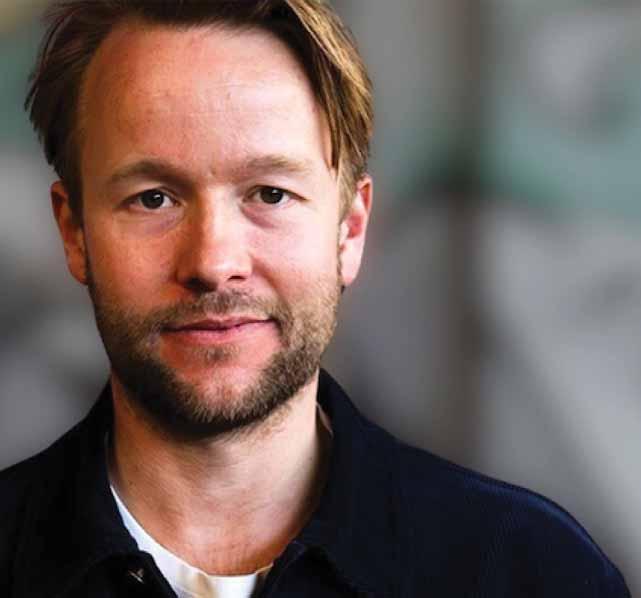
IT WOULD HAVE BEEN AN IDEAL STARTING POINT.
Yes, it would have been. All nine could have been decided then and there, but I am afraid our European leaders do not yet have the courage to go as far as is necessary at the moment.
ON TO GEORGIA THEN, A SUBJECT ON WHICH YOU HAVE BEEN VERY VOCAL FOR QUITE SOME TIME NOW. WHAT DID YOU DISCOVER ON THE EP FACT-FINDING MISSION TO GEORGIA?
What I discovered, first and foremost, is that the speed with which Georgian Dream is trying to turn Georgia into a Russian-style autocracy is so much quicker than I had expected. It’s startling. You see political opponents being hunted down, police brutality in streets, attacks on media and journalists – all these are unacceptable and the EU should have acted long ago, imposing targeted sanctions that the European Parliament has called for on multiple occasions, on Ivanishvili, his family and inner circle. It’s all so very Russian. About 50 families are profiting from the repression and exploitation of the Georgian people.
SO FAR, WHAT WE’VE SEEN FROM THE EU ARE REPEATED CONDEMNATIONS AND SECONDARY DIPLOMATIC SANCTIONS. IS IT REALISTIC TO EXPECT MORE FROM THE EU AS A BLOC, WITH ORBAN AND FICO BEING GEORGIAN DREAM ALLIES?
It might seem unrealistic at the moment, but things that seemed unrealistic merely months, or a couple of weeks, ago have become very much more realistic today.
The last resolution that we adopted with the European Parliament was very clear and very strong. And if the suggestions made in that resolution were adopted by the European Council, that would be a great step forward. I'm also trying to convince the French government, with my French colleagues that are in support of Georgia, to unilaterally do it, but I think while in some cases President Macron has shown the necessary courage, in this case, he is not living up to what history is asking of him.
THE LEGITIMACY OF THE GEORGIAN GOVERNMENT STILL HANGS IN THE AIR, AND WE HAVEN’T ACTUALLY HEARD FROM THE EU WHETHER IT CONSIDERS THIS GOVERNMENT LEGITIMATE OR ILLEGITIMATE. WHAT ARE THEY WAITING FOR?
That’s exactly the question I have been asking as well - What are you waiting for? And I don't get any answer that is satisfying. They had months to make up their minds. We are talking about a country where more than 80% of the population wants to join the EU and has fought for the European way in the streets, waving EU flags, standing up for values that the European Union was founded upon. They need an answer.
IS THERE A DANGER THAT THE LONGER THIS GOES ON, THE FURTHER DOWN GEORGIA WILL BE ON THE EU AGENDA, AND THE MORE DESENSITIZED THE EU WILL BECOME TO IT?
“AH, OK, THAT’S JUST THE WAY GEORGIA IS. TOO BAD, CAN’T BE HELPED. BEST TO TALK WITH THIS GOVERNMENT STILL, AS OPPOSED TO COMPLETE ISOLATION.”
For Europe to stand up, we need our heads of state to get out of the nationalistic tunnel they have been in for the past decades. Walking out of that tunnel is not impossible, but it depends on their strength of will to think and act European
Continued from page 1
Speculation about a potential reset in US-Russia relations persists, though concrete scenarios remain difficult to predict at this early stage. The trajectory of US policy toward Russia will likely be shaped by developments in negotiations to end the war in Ukraine. Trump has signaled his willingness to impose new sanctions and tariffs on Russia if negotiations proceed unfavorably, yet contradictory remarks regarding the potential easing of sanctions and deepening US-Russia economic relations have only added to the ambiguity. Meanwhile, the future of US-European security and defense cooperation remains uncertain. In response, the European Union, along with the UK has intensified efforts to enhance its security capabilities, with plans to substantially increase spending on defense, security, and military production in the coming years, along with the possibility to establish new security mechanisms. Amid this geopolitical uncertainty, it is critical for Georgia to understand how the new U.S. administration perceives the Black Sea region. Although no direct statements have been made regarding Georgia or the Black Sea Region, the administration’s broader foreign policy priorities allow for some discussions.
THE BLACK SEA: A CROSSROADS OF GEOPOLITICAL COMPETITION
In the current unstable international order, the Black Sea region has become a focal point of geopolitical rivalry. Russia’s invasion of Ukraine underscored the strategic importance of this region, drawing in key global players such as Russia, China, Iran, Europe, and the United States.
The ongoing war in Ukraine has disrupted the regional balance of power, necessitating the establishment of a new security framework that ensures peace, stability, and economic resilience. The active engagement of Europe and the United States is essential in this process.
Russia’s overarching objective is to transform the Black Sea into a zone of exclusive influence, effectively making it a “Russian lake.” This strategy aligns with Moscow’s broader ambition of reestablishing a Soviet-era sphere of control. Additionally, Russia seeks dominance over the Middle Corridor, a vital trade and energy route between Europe and Asia. To achieve these goals, the Kremlin employs a mix of military expansion, hybrid warfare tactics, and economic pressure. The deepening Russia-Iran alliance further complicates regional dynamics, with Moscow seeking to leverage this partnership to strengthen its foothold in the Caucasus and marginalize Western influence.
China, meanwhile, is steadily expanding its economic presence in the Black Sea region through strategic investments, such as its involvement in Georgia’s Anaklia deep-sea port. These investments support Beijing’s Belt and Road Initiative and serve to enhance China’s geopolitical influence over the Middle Corridor. The recent Georgia-China Strategic Partnership Agreement and Chinese involvement in critical infrastructure projects underscore Beijing’s long-term interests in the region.
Turkey, viewing itself as a regional power, pursues a strategy of maintaining a delicate balance between major players. While Ankara seeks to counter Russian influence, it also avoids pushing Moscow toward total collapse. At the same time, Turkey strongly supports Ukraine’s sovereignty and territorial integrity and reflects readiness to assist Ukraine with the various means.
Europe, for its part, is working to diversify its energy supply chains and reduce dependence on Russian resources, making the Black Sea an increasingly critical component of European energy and trade security.
The Trump administration views China’s economic expansion as a primary national security challenge. A trade dispute between Washington and Beijing has already led to the imposition of tariffs, and Secretary of State Rubio has explicitly identified China as the greatest threat to US national security. His early diplomatic engagements, particularly with the QUAD nations, signal a clear commitment to countering Chinese influence. Simultaneously, the administration is working to curb China’s role in the Panama Canal and remains firmly opposed to BRICS, as Trump has repeatedly emphasized. On Iran, Trump has reinstated the maximum pressure campaign through executive orders and reaffirmed a strong US-Israel partnership aimed at deterring Tehran’s regional ambitions. However, US tries to negotiate with Iran on nuclear issues
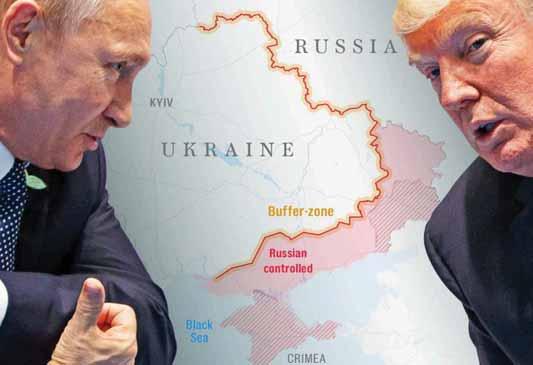
with the mediation of Russia.
Regarding Ukraine, Washington has publicly committed to ending the war in a way that prevents future conflicts. However, the specifics of potential concessions from both Kyiv and Moscow remain uncertain. Ukraine continues to demand robust security guarantees, while the U.S. has yet to propose a framework that meets the expectations of all parties. Key questions remain: How can the US provide Ukraine with credible security guarantees? Will Washington continue military support for Ukraine if a settlement is reached? What territory will Ukraine be able to reclaim? In addition, will Europe deploy peacekeepers to help maintain lasting peace?
THE US STRATEGY FOR ENGAGEMENT IN THE BLACK SEA REGION
To counterbalance the growing alliance between Russia, China, and Iran, the United States must adopt a comprehensive strategy that integrates military deterrence, economic investment, and diplomatic engagement. If the war in Ukraine continues, the Black Sea’s strategic significance for Washington will only grow.
One essential measure for US engagement is increasing the rotational presence of NATO forces in Black Sea member states. Conducting regular military exercises and enhancing naval and aerial patrols would help reinforce freedom of navigation while counteracting Russia’s militarization efforts in the region. In addition, boosting the military capacity of non-NATO Black Sea states, such as Georgia and Moldova, would serve as a deterrent to adversarial influence and contribute to regional stability.
Another key aspect of this strategy involves developing new security alliances. Establishing a Black Sea security initiative modeled according to the Baltic Security Initiative can be effective, alongside the activation of existing platforms such as the Bucharest Nine and the Three Seas Initiative, could significantly enhance regional cooperation and coordination among allies.
Beyond military and security considerations, economic measures are also crucial. Washington should work to counter China’s growing economic influence by offering alternatives to Chinese investments in critical infrastructure projects. This could be achieved through financing provided by the US International Development Finance Corporation (DFC), in collaboration with European partners, ensuring that Black Sea nations are not overly dependent on Chinese or Russian economic initiatives.
Equally important is supporting democratization efforts in the region. Strengthening democratic institutions will be vital for ensuring political stability and resilience against external interference, particularly Kremlin-backed disinformation campaigns. By reinforcing democratic governance, the United States can help Black Sea nations build stronger, more independent institutions that are resistant to authoritarian influence and external destabilization efforts.
GEORGIA’S STRATEGIC ROLE IN REGIONAL SECURITY
Georgia has a pivotal role in the geopolitical contest for influence in the Black Sea. Russia, China,
and Iran each have vested interests in Georgia, and their success in consolidating influence would significantly weaken the West’s regional presence.
To counteract these pressures, Georgia must first address its internal political challenges and reestablish democratic governance. US and European engagement will be critical in facilitating this process. Renewing Georgia’s strategic partnership with the United States and restoring its international credibility will be key to securing long-term security guarantees.
While NATO membership remains Georgia’s ultimate security goal, the current geopolitical landscape necessitates interim security measures
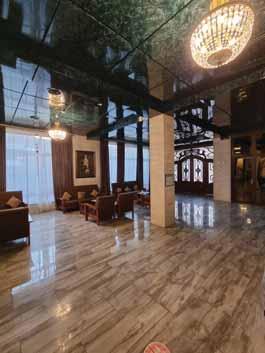
to ensure the country’s stability and resilience. One potential option is the establishment of bilateral security guarantees, with the United States, EU states or UK providing security assurances to Georgia in a manner similar to the AUKUS framework. Such an arrangement would bolster Georgia’s defense capabilities and strengthen its strategic partnership with the West.
In addition to military assurances, increased Western investments in Georgia’s economy are essential. Expanding U.S. and EU engagement in Georgia’s energy and infrastructure sectors would not only contribute to the country’s economic development but also serve as a counterbalance to growing Chinese and Russian economic influence. By reinforcing both security and economic ties, Georgia can enhance its strategic position while continuing its path toward full Euro-Atlantic integration.
Additionally, Georgia must effectively communicate its strategic value to the Trump administration. If Washington perceives Georgia as solely a European issue, it may defer responsibility to the EU, which lacks the necessary mechanisms to address Georgia’s security challenges adequately.
The Black Sea region has emerged as a battleground for global powers, with the Trump administration facing the challenge of countering Russian, Chinese, and Iranian influence. The extent of U.S. engagement in the region will depend on whether Washington adopts a truly global containment strategy or focuses solely on select theaters of competition.
For the West, allowing Russia, China, and Iran to expand their foothold in the Black Sea would constitute a significant geopolitical setback. Ensuring Georgia’s security and stability is integral to maintaining Western influence and upholding a rulesbased order in the region. Strengthening democratic institutions and fostering deeper US-Georgia cooperation will be key in achieving these objectives.
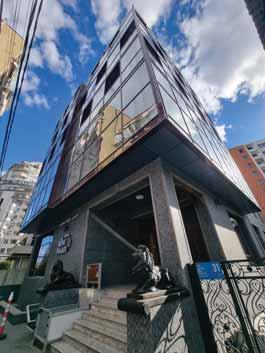


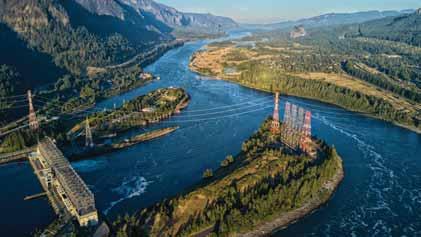
BY MARIAM RAZMADZE
Anew hydroelectric power plant, ‘Kaspi HPP’, will be constructed on the Mtkvari River in Kaspi Municipality. The study on the project’s feasibility has already been published on the environmental assessment portal, with LLC ‘NC 2022, ’ founded in 2022, supervising its development and Gocha Museliani listed as its director. Museliani also leads ‘Imer Energy Capital,’ which is planning a cascade of hydroelectric power plants
on the Dzevra River in the Terjola Municipality, Imereti.
The run-of-the-river hydropower plant will have an installed capacity of 22.4 megawatts and is expected to generate approximately 90.2 million kWh of electricity annually. The infrastructure will encompass a dam, a power unit, a fish pass, bank protection walls, and water intake structures.
The scoping report pointed out potential environmental impacts, specifically on the river’s hydrology, fish populations, and the surrounding ecosystem.
To have such impacts under control, the project also includes measures such as the construction of a fish pass.
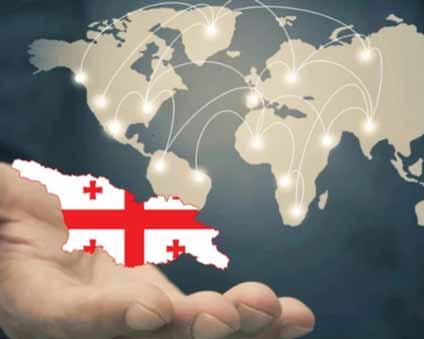
BY MARIAM RAZMADZE
The National Office of Statistics Geostat) recently published a report revealing that foreign direct investment (FDI) in Georgia dropped to $1.333 billion in 2024, seeing a 29.9% decline compared to the previous year. Such a decrease is mainly associated with the low equity capital inflows and reduced rates of reinvestment. As a result, this is the second consecutive year of declining FDI, raising concerns about Georgia’s investment climate. TOP INVESTOR COUNTRIES AND SECTORS
LEADING INVESTOR COMPANIES Among the top investors in Georgia in 2024 were:
IDS Borjomi Georgia & IDS Borjomi Beverages Company (Georgian branch)
EFES Georgia Named Winner at the 'Corporate Sustainability Award - Business for SDGs' Contest in 2 Categories!
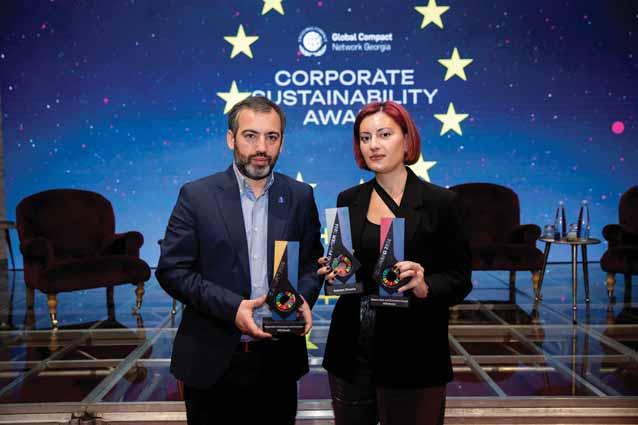
Economic Success with Social Responsibility – Organized by the UN Global Compact Network Georgia and supported by Sweden’s financial assistance, the ‘Corporate Sustainability Award – Business for Sustainable Development’ ceremony was held for the 7th time.
The event aimed to recognize responsible businesses that contribute to the implementation of the corporate sustainability agenda in Georgia.
Quality Education; Decent Work and Economic Growth; Sustainable Cities and Communities; Responsible Consumption and Production; Peace, Justice, and Strong Institutions; Partnerships for Sustainable Development – This year, winners were selected in six key categories aligned with the Sustainable Development Goals (SDGs). In each nomination category, there were two winners: one representing large businesses and the other small and medium-sized enterprises (SMEs).
Based on the evaluation of an independent jury composed of Georgian and international members, EFES Georgia received awards in the large business category in two nominations: Decent Work and Economic Growth and Responsible Consumption and Production. Additionally, at the awards ceremony, UN Global Compact Network Georgia’s SDG Pioneer 2024 Award in the large business category was presented to Keti Zhvania, Public Relations and Digital Communications Manager of EFES Georgia.
“Corporate sustainability is a declared priority for EFES Georgia,” says Keti Zhvania, Public Relations and Digital Communications Manager of EFES Geor-

gia. “For over 16 years, we have been implementing various projects in the field of corporate responsibility. The awards received within the framework of the UN Global Compact Network Georgia’s program are a recognition of our efforts in this direction, reaffirming that we are on the right path. In the future, we will certainly continue and expand our activities to strengthen a decent work environment, contribute to the economic growth of both our company and the country, and further develop sustainable consumption and production.”
At the event, discussions were held
with the participation of winning companies, as well as representatives of the diplomatic corps and international organizations. Levan Iselidze, Marketing Director of EFES Georgia, and Keti Zhvania took part in panel discussions focused on the award’s categories thematic.
ate a more welcoming environment for foreign investors as its investment figures are declining for the second year in a row.
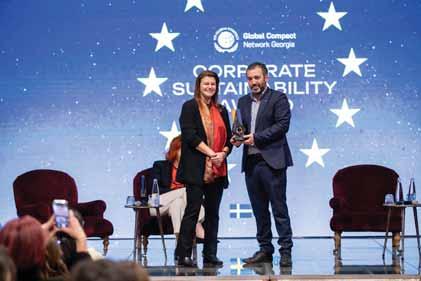
“In 2024, compared to the previous year, business interest and engagement in corporate sustainability have increased significantly,” Salome Zurabishvili, Executive Director of the UN Global Compact Network Georgia, noted. “This year, the number of applications for the seventh ‘Corporate Sustainability Award – Business for Sustainable Development’ has grown considerably. In the first stage of the competition, 157 applications were submitted, and after the initial selection, 110 applications advanced to the second round.
“We believe that in the 21st century, sustainability is a competitive advantage. Efficient resource utilization, risk reduction, and the creation of long-term value—implementing ethical business practices and promoting societal wellbeing—are becoming increasingly attractive for Georgian businesses each year.”
The organizers of the event plan to continue recognizing responsible businesses in Georgia in the future. Businesses from the regions will also have the opportunity to participate in the ‘Corporate Sustainability Award – Business for Sustainable Development’ initiative.
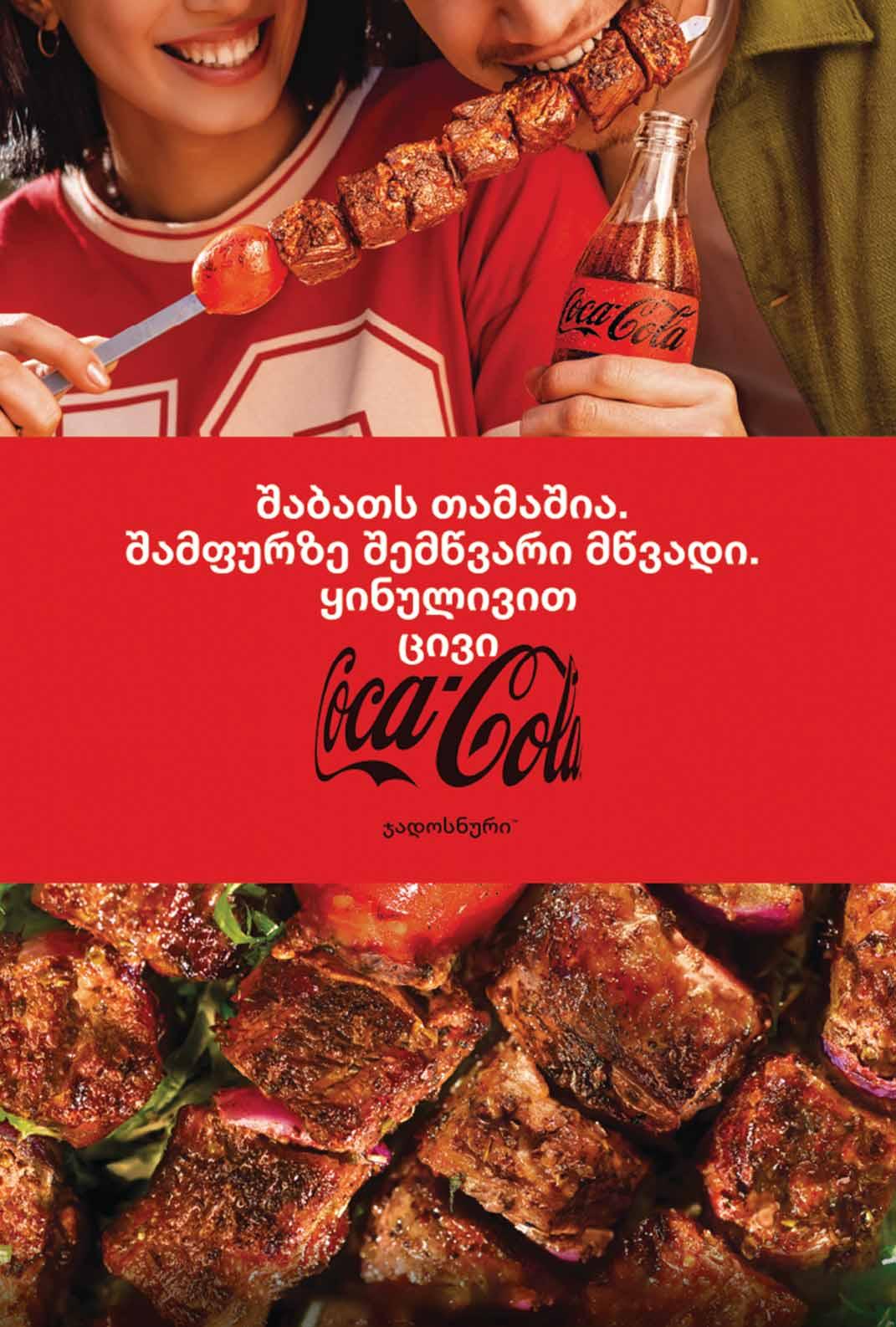
BLOG BY TONY HANMER
Fotografia Gallery is turning out to be a fruitful place for making new friends among both the Georgian and expat communities. Case in point: Michael Hanson, from the UK, who I met at the gallery’s recent ‘Eyewitness’ show opening.
For Michael, it all started with a supra, the typical Georgian feast, this one in Bristol, UK, about 18 years ago. It was organized by the leader of the Borjali Georgian choir, based in the same city. Michael, a baker all his life, learned the supra’s traditions, and was suitably impressed.
Some years after that, he had a dream of Tbilisi a couple of centuries earlier, of which he claims he’d had no knowledge, either written or pictorial. He visited on holiday, and a couple of years after that, sold his businesses (two pizzerias, one of them mobile), switched dough for dough so to speak, and prepared to move here to settle in. His first impression of the city was a bit on the fancy side, having been shown more of the touristy, high-end parts, not authentically Georgian
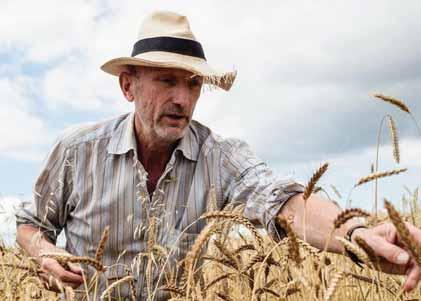
enough for him. “Beautiful country, great food and hospitality.” He then returned by train from Kars, Turkey to the UK. Things were beginning.
Then, a partnership with Jean-Jaques, a French baker who is into the old wheats here, including setting up a bakery behind Stamba Hotel. Michael was also connected with Kakheti all this time, coming
and going around Sighnaghi. He moved there during the pandemic, joining friends who had a choir and AirBnB there, and became connected with Kideli, an organization to help special needs young people. Here, Michael baked for that group, and also taught them baking.
Easter three years ago, and he was starting to discover the traditional Geor-
gian paska bread, and wanted to start supporting the Kideli organization by baking and selling it. He asked about who made the best version of it locally, and everyone agreed on one middle-aged lady, Tamila, who was legendary for her sourdough starter, for which everyone came to her. Off they went, he and his local investigator, by taxi to Iliatsminda, the required village, near Sighnaghi. They found her, somewhat nervous to share her secrets until he showed her photos of himself baking, and then she warmed up.
Covid ended, Michael returned to Tbilisi and built a couple of commercial pizza ovens. The Russian invasion of Ukraine started… city rents multiplied thus… and he determined to move back to Iliatsminda. He asked Tamila to poke around for anything available, and eventually this brought fruit. A nearby neighbor wanted to sell her run-down adobe house (similar to almost all houses in this former Molokan settlement, started by religious exiles from Russia in the time of Empress Catherine the Great): “$4000. Come and see!”
400 plots on four roads make up the village, each with 2500-3000 square meters of land and an adobe house. The land being zoned agricultural, he bought
it on the spot, in Tamila’s name. No bargaining needed. From sourdough to settlement. No electricity, no gas, no water, a leaky roof. The downstairs floor had been used as a barn for cows for many years. Plenty to do.
Where to get more of those adobe bricks to rebuild? It turned out that many locals in the village were simply looking for someone to take bricks off their hands from their own run-down houses! But Michael also learned how to make them, using strata of the local earth, especially from nearby riverbanks. And to resurface the outside walls of his house, using a less stone-mixed version of the same clay. In short, he is remaking himself a life, far from the bustle of big city life, where he can be of use and part of a community. Welcome home.
All photos courtesy of Michael Hanson.
Tony Hanmer has lived in Georgia since 1999, in Svaneti since 2007, and been a weekly writer and photographer for GT since early 2011. He runs the “Svaneti Renaissance” Facebook group, now with over 2000 members, at www.facebook.com/groups/ SvanetiRenaissance/ He and his wife also run their own guest house in Etseri: www.facebook.com/hanmer.house.svaneti
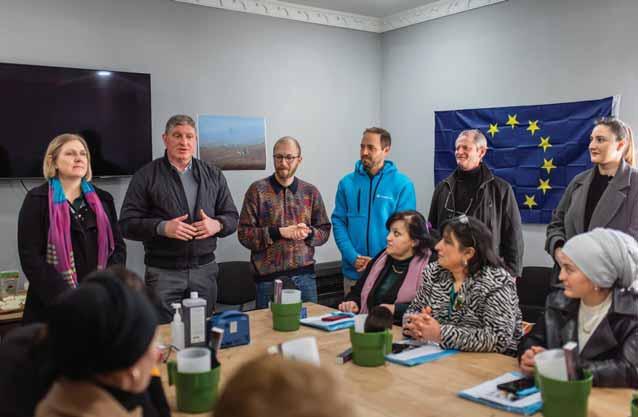
BY GEORGIA TODAY
Representatives from the Food and Agriculture Organization of the United Nations (FAO), the European Union (EU) Delegation, and Sweden joined local women dairy farmers in Tsalka to celebrate International Women’s Day. The event featured a hands-on cheese-making masterclass and highlighted key elements of FAO’s ongoing training programs focused on food safety in small-scale dairy production. The event served to reaffirm the EU, Sweden, and FAO’s commitment to supporting rural women.
The women farmers participating in the event have all received valuable training and financial support aimed at improving their production processes and enhancing food safety through the fourth phase of the European Neighborhood Program for Agriculture and Rural Development (ENPARD IV).
During the event, the women agricultural producers worked alongside Nich-
olas Cendrowicz, Head of Cooperation at the EU Delegation to Georgia, Elisabet Brandberg from the Embassy of Sweden, and FAO Program Manager Guido Agostinucci to prepare fresh semi-hard white cheese (Halloumi). They also tested the milk for subclinical mastitis using the California Mastitis Test (CMT) kit. Additionally, milk quality and safety were assessed through Lactoscan, antibiotic, and aflatoxin rapid tests. These activities are part of the FAO training modules under ENPARD IV, which are delivered through the Farmer Field School platform.
Thanks to support from the EU and Sweden under ENPARD IV, the FAO has shared technical knowledge on food safety with over 3,000 women dairy farmers. Of these, 221 farmers are receiving matching grants to upgrade their equipment and facilities to meet improved food safety standards. As a result, these farmers are now better equipped and knowledgeable to produce safer dairy products. Moreover, the smallholder women producers who have used matching grants to purchase food safety-related dairy equipment are seeing improve-
ments in both production efficiency and product quality.
“Georgian women are leading the country’s dairy sector and providing consumers with the dairy products we all enjoy. Today, we’re celebrating International Women’s Day with the women dairy farmers in Tsalka, one of the most active and important regions for dairy production. With the support of the EU and Sweden, FAO has been empowering local dairy farming communities under ENPARD IV by sharing essential knowledge and skills, particularly around food safety. FAO has also made dairy production equipment more accessible through a matching grant program. In Tsalka alone, nearly 135 women dairy farmers have received financial assistance, and we are proud to offer even more opportunities for women to gain knowledge and access finance,” said FAO Program Manager Guido Agostinucci.
“We’re marking International Women’s Day today in Tsalka with local dairy women farmers. The EU stands strongly with Georgian rural women dairy producers who supply a wide range of cheeses, especially popular in Georgia’s
major cities. Access to knowledge and finances can be a challenge for many women in rural areas, and we are proud to continue supporting them in ensuring their products meet the highest safety and quality standards through our successful partnership with Sweden and FAO under ENPARD IV,” said Nicholas Cendrowicz, Head of Cooperation at the EU Delegation to Georgia.
“Sweden supports women’s empowerment every day of the year. Today, we have the opportunity to celebrate Georgian women’s contributions to dairy production, highlighting their tireless efforts to provide for their families and the country. With FAO’s food safety training modules and the matching grant program, which Sweden supports under ENPARD IV, hundreds of women farmers are now better equipped to produce higher-quality and higher-value products more efficiently, with less physical strain. This vital work has improved the competitiveness and income potential of the participating women. These women are stronger players in the market than ever before,” said Elisabet Brandberg, Head of Development Cooperation and Deputy Head of Mission at the Embassy of Sweden.
ABOUT THE EUROPEAN UNION
For over 30 years, the European Union has built a close partnership with Georgia, supporting its development through
knowledge sharing, expertise, innovation, and financial aid. The EU’s relationship with the citizens of Georgia is rooted in shared values of peace, freedom, democracy, human rights, and inclusive economic growth.
ABOUT ENPARD
The European Union supports rural development in Georgia through its ENPARD Program, aimed at reducing rural poverty. Since its inception in 2013, ENPARD has helped develop the country’s agricultural potential and created economic opportunities for rural populations. Since 2021, the program has also focused on improving food safety in Georgia, with additional support from Sweden and implementation led by FAO and the Czech Development Agency as part of ENPARD IV.

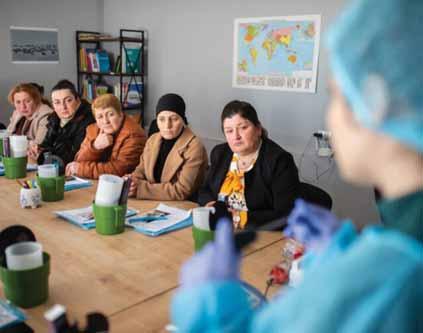
BLOG BY NUGZAR B. RUHADZE
She looks and feels as young and vigorous as one can be at this mature, yet still very enjoyable stage of life, remaining inexhaustibly productive in her creative endeavors, just as she always has. This nation, as well as the world of poetry and literature in general, has embraced her works with great affection. Her name is well known through her books and articles, all written in a deep and elevated scientific style, yet still uncannily accessible and entertaining for even the ordinary reader. Her thoughtprovoking and captivating public appearances consistently draw large audiences of diverse ages and interests.
A full member of the National Academy of Sciences of Georgia and the founder and chair of the Translating Arts department at Tbilisi State University, Professor Innes Merabishvili has created academic programs that have produced tens of Master's and Doctoral graduates who are now successfully engaged in educating the future generations of Sakartvelo. These young minds will, in the future, take on the responsibility of managing their homeland. I have personally witnessed her magical approach to working with our young men and women at the university, as well as with the children at the renowned Byron School of Tbilisi, which she founded more than thirty years ago. This was during the most difficult times
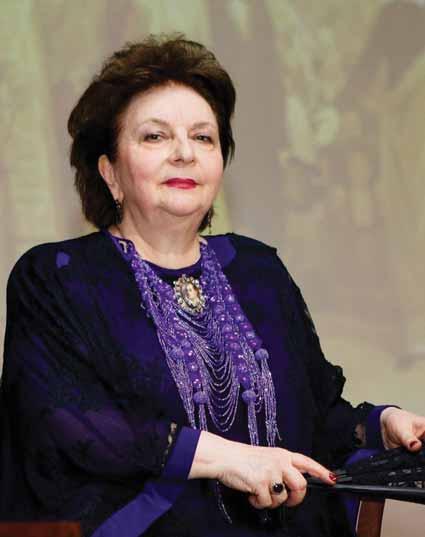
for Georgia, when the country was undergoing significant social, economic, and political transformations, having been plunged into unexpected darkness and uncertainty. Yes, Innes was one of those rare Georgian patriots who upheld the crumbling educational system of the nation. This tireless lady of letters and pedagogy went to great lengths, working extra hard to make something positive happen in this land, particularly to help devastated families and their children feel happier in the nurturing educational environment she had personally cultivated, all at the expense of her patience and finances.
Innes has raised thousands of young people throughout her life, guiding them onto the right path in life, not to mention raising a beautiful family of her own. Remarkably, in the process of solving numerous pressing problems and overcoming the obstacles that life in Sakartvelo presented at that time, Innes Merabishvili transformed herself into a thoughtful Byron scholar and translator of international acclaim. Her profound insights and conclusions in the field were regarded by specialists as valuable contributions to Byron studies.
It is not only her scholarly contributions to interpreting the great English poet's life and literary legacy that are noteworthy but also her role in presenting him to the global community as a figure of great significance, particularly through her leadership of the Georgian Byron Society, where she served as president for many years.
Additionally, Innes Merabishvili played a pivotal role in introducing the world to the Georgian genius Galaktion Tabidze. It is thanks to her exceptional translation of Galaktion's works that the world has come to appreciate Tabidze's poetic treasures. Innes employed three subtle tools to accomplish this remarkable task: a mastery of the English language, an innate sense of poetry, and a linguistic analysis method she developed during her early years, now taught intensively at her alma mater as part of the Translation Arts course.
Writing or speaking about Innes Merabishvili is both easy and difficult. Easy because there is so much to reflect upon—she has never stopped writing what she believes is worthy of bequeathing to future generations. Difficult because every word written or spoken about her must be carefully considered and fairly presented to the public.
It is a great joy to know that Innes is still firmly holding the pen, dipping it into ink. Let us wish our wonderful lady of philosophical reason and emotional subtlety the strength to continue her work with the same vigor and dynamism with which she has embarked on her great projects—each undertaken with courage and dedication. And, most importantly, may she deliver to us the finest translation of the phenomenal Georgian epic, The Knight in the Panther's Skin—her highest mission for the nation, which Innes Merabishvili has shouldered with great responsibility, determined to bring it to triumph.
BY IVAN NECHAEV
The stage of Tbilisi’s Marjanishvili Theater trembled with the pulse of Buenos Aires as Astor Piazzolla’s iconic tango opera María de Buenos Aires unfolded before an enraptured audience. Over the course of four evenings—March 8, 9, 10, and 11—the hypnotic rhythms of nuevo tango merged with surreal poetry and evocative performances, bringing Piazzolla’s enigmatic María to life. The production, spearheaded by the Tbilisi State Chamber Orchestra ‘Georgian Sinfonietta’ and supported by the Ministry of Culture of Georgia and Tbilisi City Hall, stood as a testament to the universality of tango’s tragic heartbeat.
Unlike conventional operas, María de Buenos Aires is not bound by linear storytelling. The libretto by Horacio Ferrer—both poetic and elusive—blurs the lines between reality and hallucination, flesh and metaphor. María is not merely a protagonist; she is Buenos Aires itself, the very soul of tango incarnate. Born in the city’s outskirts, she is drawn into its seductive yet merciless embrace, only to perish and be reborn in a cycle of passion, exploitation, and transcendence. Her story is a reflection of tango’s own history—its birth in the brothels and streets, its rejection by high society, its decline, and its eventual renaissance.
The production’s brilliance lay in its seamless interplay of musicians, vocalists, and actors. The titular role of María was brought to life with haunting intensity by Mariam Chukhrukidze and Tamar Gochashvili, each imbuing the character with distinct shades of vulnerability and defiance. Tornike Sakhokia’s performance as the Payador—a poet, a voice of fate, a spectral observer—provided a brooding counterpoint to María’s volatile presence. Karlos Klaumannsmoller’s narration enveloped the audience in the opera’s dreamlike atmosphere, his voice threading the narrative’s surreal labyrinth with gravitas.
Under the masterful baton of German conductor Cornelia von Kerssenbrock, Georgian Sinfonietta navigated Piazzolla’s rhythmic complexities with fervor and precision. The hypnotic pull of the bandoneón, played by Argentinian virtuoso Marcelo Nisinman, became the opera’s heartbeat—breathing anguish and ecstasy into every note. Pianists Tamar Licheli and Teona Mikeladze, guitarist Vache Laliashvili, flutist Irakli Evstaphishvili, and percussionist Giorgi Melikishvili formed a tapestry of sound that mirrored Buenos Aires itself: chaotic, melancholic, and intoxicating.
THE DIRECTORIAL VISION: WHERE DREAMS AND DECAY COLLIDE
Director Davit Sakvarelidze’s interpretation leaned into the opera’s hallucinatory nature, crafting a world where past and present blurred into an intoxicating dreamscape. Set designer Nino Kobiashvili transformed the stage into a pulsating Buenos Aires—dark alleyways, greasy sofas in the favelas, gambling in the pubs, and spectral figures forming an evershifting urban nightmare. Mariana Fernández’s choreography wove traditional tango with expressive movement, capturing both the sensuality and violence of María’s journey.
The result was an experience that transcended performance—a fever dream where tango’s rhythms became an incantation, summoning ghosts of the past and visions of the future. This was not a mere retelling of María’s fate; it was an invocation of the eternal tango spirit that refuses to die.
THE HEARTBEAT OF THE PERFORMANCE: GEORGIAN SINFONIETTA AND CORNELIA VON KERSSENBROCK
At the core of this production was the Georgian Sinfonietta, one of Georgia’s leading chamber orchestras, renowned for their versatility and commitment to both classical and contemporary repertoire. Since its founding, the ensemble has been a major force in the country’s cultural landscape, performing a wide
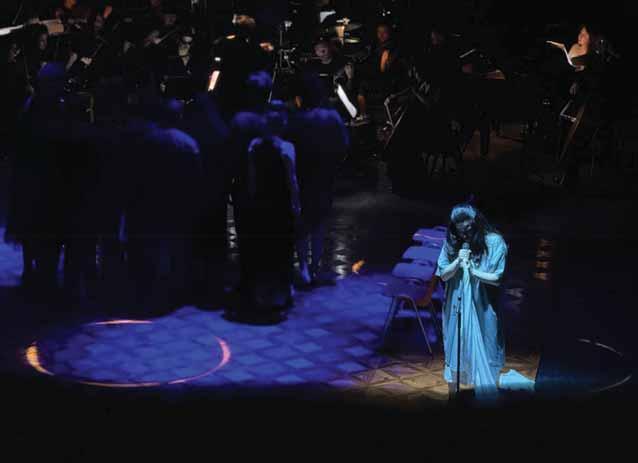
Photo by the author
array of works that span Baroque, Romantic, and modern compositions. Their mastery of Piazzolla’s intricate and unpredictable rhythms was nothing short of extraordinary, showcasing their ability to blend classical precision with the raw, emotional fervor of tango. Leading the orchestra was German conductor Cornelia von Kerssenbrock, whose nuanced and deeply expressive interpretation of Piazzolla’s score ensured that every phrase carried the weight of the story’s passion and despair. With an extensive background in both opera and symphonic music, Kerssenbrock brought a unique sensibility to the performance, shaping the music with a keen sense of drama and contrast. Her ability to balance the dynamic shifts of Piazzolla’s music—moving seamlessly
between moments of fiery intensity and aching lyricism—elevated the production to new heights.
A NIGHT OF SHADOWS AND PASSION
For a city with a deep appreciation for classical and contemporary music, this production marked a cultural milestone. Piazzolla’s María de Buenos Aires is not merely a performance—it is an initiation into the hypnotic underworld of tango. Georgian audiences, accustomed to grand operatic narratives and symphonic majesty, found themselves immersed in something more elusive yet deeply visceral.
The success of María de Buenos Aires at Marjanishvili Theater signals an evolving cultural landscape in Tbilisi—one
that embraces hybrid forms, boundarypushing narratives, and global artistic dialogues. Through the lens of tango, the city connected with Buenos Aires across continents and decades, proving that passion, tragedy, and resurrection know no borders. As the last notes of the bandoneón faded into silence, and María’s ghostly presence dissolved into the shadows, the audience was left with a lingering sense of longing—perhaps the very essence of tango itself. In the echoes of Piazzolla’s music, Tbilisi found itself momentarily transformed, wrapped in the melancholic embrace of Buenos Aires.
Astor Piazzolla once said that tango was not for the ears, but for the soul. If that is true, then for four nights, the soul of Tbilisi belonged to María de Buenos Aires.
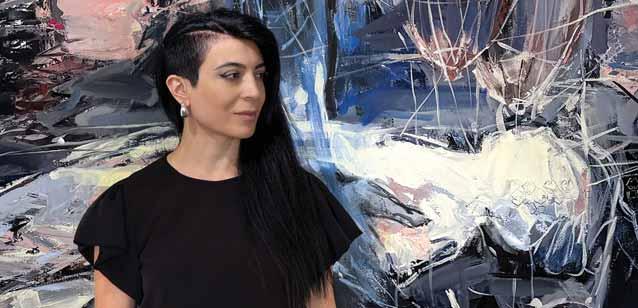
BY TEAM GT
Times are very strange, uncertain, different. In such times, we need of more ‘art’ around us to keep our hearts and minds steady. So after a short break, BI Auction is again working in collaboration with GEORGIA TODAY to introduce Georgian Artists in interviews. This week we met with Maka Zedelashvili.
A multimedia artist with more than 30 years of experience in fine art, Maka Zedelashvili uses diverse techniques and materials to make her ideas more expressive and tangible.
“Despite the challenging social conditions that were an unavoidable reality for children and families in Georgia, my parents supported my dream of becoming an artist,” she tells us. “The years deepening my artistic knowledge, which began at an art college and continued at the Tbilisi Academy of Arts, gave me even greater motivation to immerse myself in painting.”
TELL US ABOUT YOUR STYLE AND THEMES.
As a Master of Fine Arts in Digital Modeling, I genuinely enjoy using my experience and access to various techniques to fully utilize possibilities and push boundaries by going beyond the canvas. Possessing technical skills is essential for ensuring the quality of your work; however, what truly matters is the message you want to convey through your art—my artworks mostly explore women's rights, religious origins, symbolism, existential struggles, and various social discourses. I strive to examine these timeless themes through a contemporary lens to make them engaging for modern audiences.
HAVE YOU PARTICIPATED IN EXHIBITIONS?
Absolutely! I share my work with local and global art lovers through solo exhibitions and collaborations. I have held several solo exhibitions in Georgia, participated in many group exhibitions, and collaborated with other local artists. My most enjoyable and rewarding experiences are linked to symposiums and residencies outside the country, though, which have allowed me to learn about different cultures and broaden my knowledge by interacting with artists from diverse backgrounds. It was very exciting to participate in such gatherings in Tunisia and Egypt. The cultural differences make an already rich artistic adventure incredibly impressive.
I try to be at the exhibition venue as much as possible while my artworks are on display, although my works travel more than I do. I have happy memories
of participating in joint exhibitions in Belgium and Germany in recent years. Viewers also enjoy seeing the artist there with the works they created
HOW WOULD YOU DESCRIBE YOUR WORK? WHICH TRENDS IN ART OR IMPORTANT ARTISTS HAD AN IMPACT ON YOU?
My work is characterized by my painting techniques and the integration of various methods, such as sculpting, creating installations, and using unique materials and digital mediums. Sometimes, a traditional canvas isn't sufficient to convey my ideas fully.
While it's challenging to identify a single person who has significantly influenced my work, I have been fortunate to have inspiring painting teachers during my artistic career.
My efforts in experimenting and trying different techniques make my work
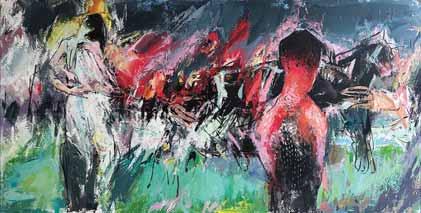
unique. In the rapidly evolving environment, the only way to make art relevant is to acknowledge the scale and speed of this expansion, as everything is progressing at a geometric rate.
NAME A PIECE OF ART YOU THINK EVERYONE SHOULD SEE IN-PERSON.
That is a tricky question. There is a lot to recommend. One thing that comes to my mind right now is Rogier van der Weyden's The Descent from the Cross, which is currently housed in the Prado Museum in Madrid. Seeing it in person feels like a frozen moment of raw sorrow and beauty. The figures weep not just with their faces, but with their entire bodies; their grief flowing through every gesture and fold of fabric. The pain in this artwork is almost tangible. You can sense the weight of Christ's lifeless body, and the shared mourning will give you goosebumps. No photo is capable of delivering such a profound feeling of witnessing something so human and sacred at the same time.
WHAT IS YOUR VIEW OF THE VIRTUAL ART SPACE, EXHIBITIONS,

BY MARIAM RAZMADZE
Asignificant academic and cultural relations event between Georgia and the UK occurred at the Royal Asiatic Society in London.
The book ‘Wardrops and Georgia’, published with the support of ‘Cézanne’, was presented in the society’s main hall, emphasizing the contributions of Sir John Oliver Wardrop and his sister, Marjory Wardrop, to Georgian studies. The information was shared by writer Giorgi Kalandia online.
The director of the Royal Asiatic Society, Alison Ohta, received a silver-gilded
medal for her remarkable role in Georgian-British cultural relations during the event, which was supported by Georgia’s Ministry of Culture and the Writers’ House. A documentary about the Wardrops was also screened.
Sir John Oliver Wardrop, a British diplomat, traveler, and translator, first visited Georgia in 1887 and later wrote ‘The Kingdom of Georgia’. He studied the Georgian language, translated ‘The Book of Wisdom and Lies’ by Sulkhan-Saba Orbeliani, and supported Georgian emigrants after the country became part of the Soviet Union. In 1930, he founded the Georgian Historical Society, which published ‘Georgica’. His sister, Marjory, translated ‘The Knight in the Panther’s Skin’ into English.
Even though the COVID-19 pandemic had a massive impact on digitalization, and everything is growing in our tailoring our daily lives to the digital space, I'm still skeptical about virtual art spaces and exhibitions. That doesn't mean they're irrelevant, though- quote the opposite: Soon, they'll be way more popular. The reason for my skepticism is the limitations we have from a technological perspective on the customer side. For the masses, devices that ensure a high-quality digital experience are not easily accessible. Conversely, digital sales and auctions are in high demand. In my case, most sales are made online, and many online platforms provide quality intermediary services.
AND LOOKING AHEAD NOW: ANY UPCOMING EXHIBITIONS OR EVENTS?
The Ria Keburia Foundation is hosting my solo exhibition, Echo of the Fall, which opened on February 23 and will continue until March 23. Most of the works were created during my residency. Visitors can see my paintings and installations. The exhibition delves into the profound significance of falling, whether it pertains to the physicality of bodies, the fragileness of emotions, or the complexities of the mind. This exhibition tells the story of a struggle between holding on and letting go in a noisy silence following a fall.
As for upcoming events, in May, I'll attend the 3rd edition of the Empower Her Art Festival in Egypt, hosted by the Grand Egyptian Museum. There, I will present my artwork alongside more than 30 artists from around the globe. In September, I'll have a solo exhibition in Hanover as part of the 28th edition of ZINNOBER-Hannover. The rest of my plans for this year are still under discussion.
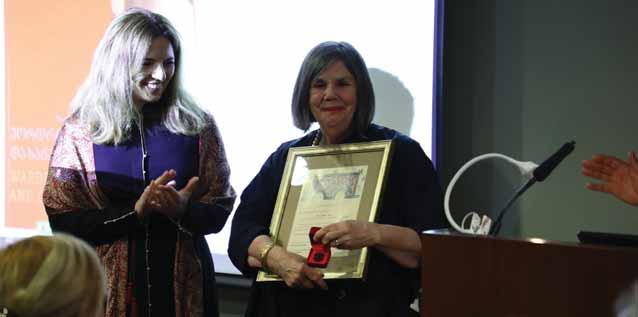
BY IVAN NECHAEV
The distress call—SOS—rings out incomplete. The last symbol is missing, an ellipsis where urgency should be, a silent scream caught in Georgia’s turbulent political vortex.
From February 9 to March 20, Window Project’s exhibition SOS assembles a striking collection of contemporary Georgian artists whose works, spanning decades, transform historical wounds into aesthetic language. The exhibition is not simply an artistic reflection, but a relentless confrontation with the past, the present, and the uncertain future. Curated under the conceptual anchor of Koka Ramishvili’s SOS series, this exhibition resurrects Georgia’s fraught history of war, occupation, and political upheaval. Ramishvili’s original works, created in the wake of the Soviet collapse, employed torn military textiles and deformed stretcher bars to reflect a nation unraveling. Today, his work returns as both an omen and an accusation: Has Georgia truly emerged from its decades of struggle, or is history repeating in a new guise?
From the existential weight of 1989 to the parliamentary violence of 2024, the artists of SOS dissect Georgia’s political landscape with unflinching honesty.
Alexander (Sandro) Antadze’s OSCE/ ODIHR Report (2025), a muted depiction of the Georgian Parliament, speaks volumes. The painting does not show a grand democratic institution, but a site of broken promises, reflecting the contested report on Georgia’s latest elections—already irrelevant before its ink had dried. Antadze’s palette of grey underscores the weight of institutional paralysis, where democratic ideals struggle to take root in soil tainted by violence and manipulation.
Tato Akhalkatsishvili’s Baby Gargantua series transforms Rabelais’ grotesque satire into a chilling meditation on the intoxication of power. His work The Big Party (2025) reconfigures the Christmas tree—a symbol of renewal—into an object of physiological distress, burned and disfigured, consumed by the hedonism of those in control. In Akhalkatsishvili’s vision, power is not a guiding force, but a monstrous appetite; forever hungry, devouring past, present, and future alike.
Uta Bekaia’s My Sweet Little Rabbit (2022) and Dato Koridze’s Noise (2024) tackle violence’s eerie persistence in Georgian society. Bekaia’s animated video, which transforms the bunny into an avatar of vulnerability, reflects on the normalization of violence, particularly against marginalized communities. Koridze, on the other hand, captures the iron barricades of recent Tbilisi protests—where citizens’ cries for justice dissolve into state-sanctioned indifference. In Noise, protest is reduced to an aural texture, a background hum, as those in power refuse to listen.
Koka Ramishvili’s The Double of Georgia (Doppelgänger) (2024-2025) renders the national flag in black-and-white contrast, emphasizing the deep polarization of the state. The imagery evokes his earlier Inverted Masterpiece (1991), which challenged the illusion of post-Soviet

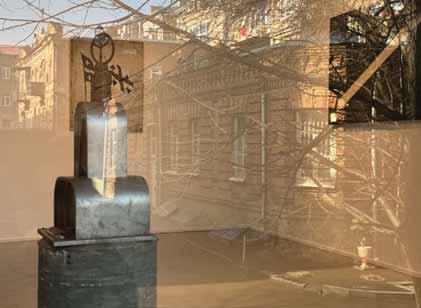

independence. Over thirty years later, Ramishvili asks: Is Georgia still wrestling with its doppelgänger, an identity fragmented between state and society, power and people?
Ani Toidze’s Gagra (2024) is an imagined eulogy for the occupied city of Gagra. Charred palm trees and opposing swings paint a landscape of nostalgia and unresolved loss. Similarly, Guram Tsibakhashvili’s photographs from 1989, 1990, and 1993 serve as a visual archive of Georgia’s long and bloody road to
PUBLISHER & GM
George Sharashidze
COMMERCIAL
DEPARTMENT
Commercial Director: Iva Merabishvili
Marketing Manager: Natalia Chikvaidze
EDITORIAL DEPARTMENT:
Editor-In-Chief: Katie Ruth Davies
sovereignty. These images are not relics, but urgent reminders that history does not disappear—it lingers, waiting to resurface in new forms.
Tamara K.E.’s Remnants of the Glaring Day (2024) constructs a complex web of symbols and signs, a final outcry against a history in freefall. Meanwhile, Mia Okruashvili’s triptych La Chute du Régime (2024-2025) etches the pain of exile and resistance into metal. Flags, fireworks, and burnt trash cans become the residue of revolution, echoes of a struggle both
Journalists: Ana Dumbadze
Vazha Tavberidze
Tony Hanmer
Nugzar B. Ruhadze
Erekle Poladishvili
Ivan Nechaev
Mariam Razmadze
Layout: Misha Mchedlishvili
Photographer: Aleksei Serov

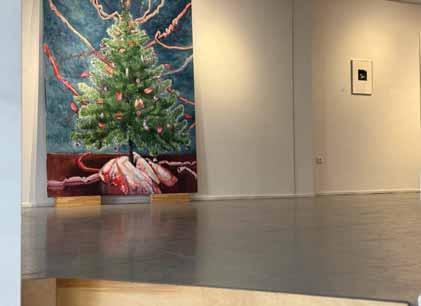
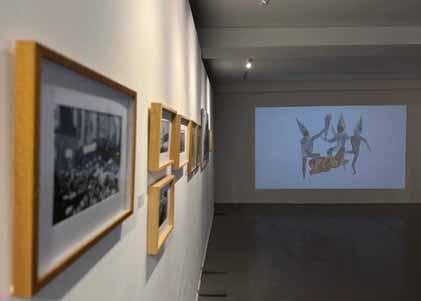
collective and intensely personal. Rusudan Khizanishvili’s Divine Flame is perhaps the most hauntingly poetic gesture within SOS. Her female-centered mythology, constructed in times of unrest, reflects the resilience of identity even amidst chaos. The flames she paints are not only destructive; they illuminate, forging new narratives from the ashes.
AN UNFINISHED SIGNAL SOS is not a passive contemplation of history—it is a direct address to the pre-
International Relations & Communications
Sofia Bochoidze E: sbochoidze@georgiatoday.ge
Website Editor: Katie Ruth Davies
Webmaster: Sergey Gevenov
Circulation Managers: David Kerdikashvili David Djandjgava
ADDRESS 22 Janashia Str. Tbilisi, 0179, Georgia
sent. Each work in the exhibition asks whether Georgia’s struggles are a closed chapter or an unfinished novel. Has the country found its voice, or is it still caught in the same distress signal, endlessly repeating, unheard?
In a world where history never quite recedes, SOS serves as both warning and invitation. Will Georgia complete its signal? Or will its call for help, like Ramishvili’s fractured letters, remain suspended—an eternal echo in a nation still searching for its own reply?
Tel.: +995 32 229 59 19 E: info@georgiatoday.ge F: GeorgiaToday
ADVERTISING & SUBSCRIPTION +995 577 72 52 61
E-mail: marketing@georgiatoday.ge
Reproducing material, photos and advertisements without prior editorial permission is strictly forbidden. The author is responsible for all material. Rights of authors are preserved. The newspaper is registered in Mtatsminda district court. Reg. # 06/4-309
